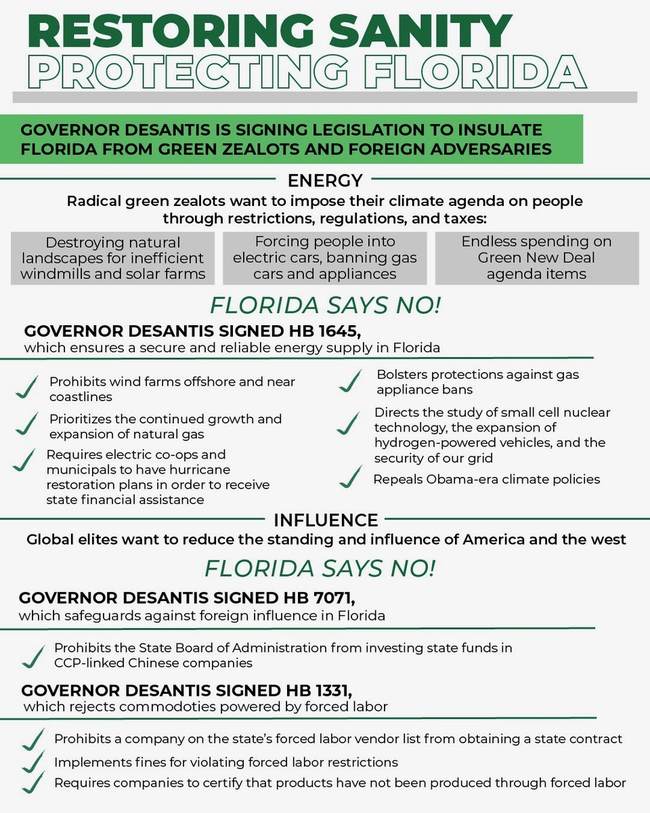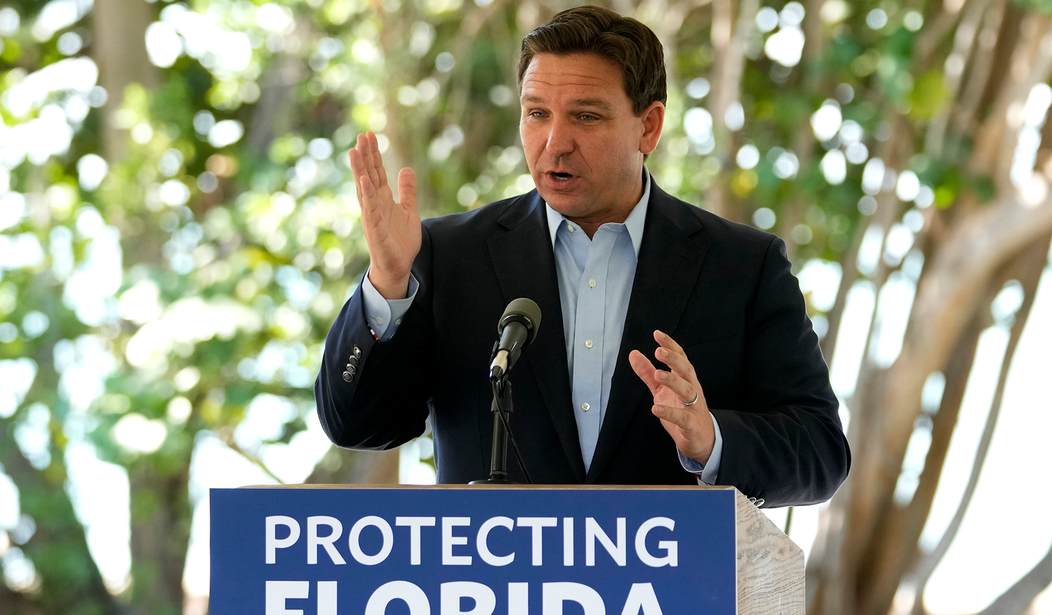To hear our friends on the left tell it, Ron DeSantis has declared himself a latter-day King Canute, presuming to end human-caused climate change with a stroke of his Sharpie across Legislature-provided paper. Scribble here. Begone, rising tides! Scribble there. Away with you, flooded streets! Finishing flourish. Enjoy your reprieve, once-sweaty Key Westians! You're welcome!
Missing entirely the moral of the King Canute story (an earthly leader proving his inability to influence events left to God) these are representative of the Greta Thunberg lobby’s reaction to the Florida governor’s (as we shall see) sensible action:
Florida Governor Ron Desantis signed legislation that deletes climate change from the state’s energy policies, bans offshore wind and weakens regulations on natural gas pipelines.
— 1% for the Planet (@1PercentFTP) May 16, 2024
Now that that's settled, we'll just get Mother Nature to follow your State Law @rondesantis 🥴 pic.twitter.com/cjR2VJQYjB
Well, given the tornadoes and flooding and such - I’m super glad DeSantis made climate change legally not a thing! Now I can sleep at night
— (((Blue Dilly Gal))) (@bluedillygal) May 17, 2024
Read "Did you hear the one about how Ron DeSantis solved climate change in Florida? | Opinion' on SmartNews: https://t.co/lORL8BaEWh
— unable to deactivate (@thomass89532427) May 17, 2024
There’s also a bunch of progressive handwringing about DeSantis’ timing, based on current weather conditions in Florida, where it’s May and it’s steamy. As someone who grew up here: That’s not news. But, you know, Democrats:
As the National Weather Service issues warnings for dangerous heat temperatures in parts of Florida, Ron DeSantis signs a bill that eliminates climate change from Florida policy. Because…priorities pic.twitter.com/i92S6GrDGm
— Florida Democrats (@FlaDems) May 17, 2024
But when skeptics of human-caused climate change (formerly global warming) remark with fascination over blizzards in the Sahara, or Los Angeles, or Madagascar, or Tehran or Dubai, they (we) are scolded for conflating weather with climate.
Do we get a two-way street on that argument? You must be joking, knuckle-dragger. And shut your mouth while you breathe.
Anyway, back to the governor’s signing ceremony.
“The legislation I signed today [will] keep windmills off our beaches, gas in our tanks, and China out of our state,” DeSantis said. “We’re restoring sanity in our approach to energy and rejecting the agenda of the radical green zealots.”
That’s three bills, if you’re keeping score at home. One regarding energy policy, one directly aimed at the Chinese Communist Party, and one, by prohibiting state contracts with companies that use forced (slave) labor, that implicates the CCP.
The governor’s office touts the new laws, taking effect in July, thusly:

It is reassuring, for the moment, that the swooning appears limited to DeSantis agreeing with the GOP-led Legislature to demote the role of climate change in the Sunshine State’s policymaking.
Among other things, the new law will block wind farms from appearing along Florida’s coastline, which seems like a useful preservation of resources for the No. 1 tourism state in the country.
“It’s very similar to offshore drilling,” notes state House Speaker Paul Renner, a Palm Coast Republican. “Floridians don’t want to sit on the beach and look at oil derricks and they don’t want to sit on the beach and look at big windmills right off the beach.”
The new law also encourages construction of pipelines to keep cheap, clean-burning™ natural gas flowing into the peninsula. And it endorses the investigation of small-scale nuclear technology, expands the use of hydrogen-powered vehicles, and beefs up the state’s electric grid security.
And, yes, it purges eight of 15 mentions of “climate change” from state law (far from “all,” as you may have been screamed at elsewhere), replacing a 2008 Charlie Crist-era policy about prioritizing reduced “greenhouse” emissions with a new goal of making energy access “cost-effective” and “reliable.”
DeSantis, for one, understands the mischief possible in the guise of noble-sounding phrases that become part of official state documents. And he’s understood for a while.
"What I've found is,” DeSantis said, responding to a reporter’s question in December 2021, “people, when they start talking about things like global warming, they typically use that as a pretext to do a bunch of left-wing things that they would want to do anyways. We're not doing any left-wing stuff.
“Be very careful of people trying to smuggle in their ideology. They say they support our coastline, or they say they support … our water, environment. And maybe they do, but they're also trying to do a lot of other things.”
Philosophy became government policy Wednesday. Gone are the days of state officials setting renewable energy targets for agencies, fuel-efficient vehicle mandates, and grants for renewable energy.
Missed in the complaining is DeSantis’ more reasonable, rational, cost-effective and (dare we say it?) sane approach to whatever is happening to the planet. Rather than throttle the state’s economy with attempts at fruitless emissions curbs — have at it, California — Florida’s governor has directed $640 million toward resilience projects on the coasts and $28 million to flooding vulnerability studies in every county.
Rep. Rick Roth, a West Palm Beach Republican, describes the bill — now act — as a tidying-up effort. “[I]t’s just about really cleaning up the language of the law to make sure it’s in line with what we need to do.”
And that would be: “The secret to protecting the planet,” Roth said, “is actually more reliable and cheaper and affordable energy. Because as people have more reliable and cheaper energy, it provides more jobs, provides more income and allows people to prosper. And when people have money in their pockets and a roof over their heads they care more about the environment. So you’ve got to protect the planet through economic growth. That’s the way to do it.”
Greg Knecht, executive director of The Nature Conservancy in Florida, sees it differently. Because of course he does.
Removing state policy supportive of carbon reducing technologies sends the wrong message to private and public investors, undermining Florida’s competitiveness and the creation of new clean energy jobs.
Rather than position Florida as a leader in innovation, legislation to strike climate change considerations removes the Sunshine State from the clean energy conversation. Florida lawmakers should recognize the incredible economic opportunity afforded by the transition to renewable energy and electric transportation and embrace — not erase — state policy supportive of de-carbonizing Florida’s economy.
And there it is. What Knecht lays out is nothing less than an argument for rent-seeking. All this “wrong message” and “undermining … competitiveness” jargon is buzzy code speak for keeping Tallahassee’s thumb on the scale. Knecht and his organization hoped to continue to use the muscle of the state to provide advantages for uncompetitive technologies, in turn raising the cost of living for all Floridians.
Here’s Knecht setting the predicate:
A forthcoming report commissioned by The Nature Conservancy in Florida, called “Economic Benefits of Decarbonization in Florida,” finds that investment in a net-zero economy results in a state economy that is nearly 2% larger than the baseline in 2050. Reduced spending on electricity and private transportation allows consumers to redirect spending in other sectors, supporting economic growth. A net-zero economy operates with clean energy and actions that address carbon emissions sources.
De-carbonizing our economy — meaning to reduce carbon dioxide emissions in manufacturing, transportation, and other parts of our economy — can drive vast job growth, and we’re already seeing results. Florida ranks second in the nation for solar power jobs and third in solar electric installation capacity. Florida is attracting manufacturing businesses that support solar, wind and EV production. Existing businesses, such as Mitsubishi and General Electric, which manufacture wind turbines, are already creating high wage jobs.
Greg Knecht’s world sounds promising. Lots of desirable, clean-energy jobs, money erupting from net-zero factories like fountains at the Bellagio, consumers living emission-free lives, and no living thing besides forests missing all that CO2.
When this inevitable world comes to fruition — because what savvy investor would miss such an opportunity — we will not miss hurricanes and hail storms and wild fires and tornadoes and flash floods and all the other natural horribles those anguished about DeSantis’ signing ceremony suppose would go away if only Florida did its part.
And so we say the clean industries touted by Knecht should have at it. We, along with Rep. Rick Roth, wish them well. As DeSantis made plain this week, the state is happy to stand out of the way.








